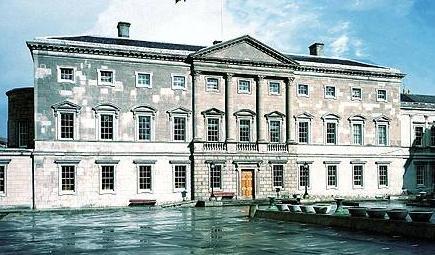Crisis makes plain the irrelevance of Dáil

The irrelevance of Dáil Éireann can hardly ever have been more evident than now, writes Vincent Browne.
In the midst of the gravest crisis to afflict the State since the Civil War, our national parliament has no role to play, 141 of our 166 elected representatives have no function. They stand by, as mere onlookers, while the remaining 15 decide in secret the fate of the country.
Most of these 15 TDs (members of the Cabinet) who do have a role were part of what we now realise was the disastrous decision to bail out all the financial institutions. A majority of these 15 were complicit in the decisions and non-decisions over the last decade that have pushed the country into this fiasco.
These people, who on their record have proved themselves incompetent, are again the decision-makers on issues that could propel us into an even deeper crisis in a few months. And the other 141 TDs stand by and do nothing. Many of them have the capacity to prevent this but won't (ie the Fianna Fáil TDs who are not Cabinet Ministers and the four Green TDs, plus a few Independents). For that's the way our system works, or rather that's the way it doesn't work.
If in the next five or six months it transpires that the "authorities" again have got the cost of the bank bailout wrong – and this seems probable, not just possible – and/or the four-year budgetary plan which the 15 incompetents (aka Ministers) have to publish in four weeks' time is not credible either arithmetically or politically, then we are in real crisis. For we will either be unable to borrow at all or able to borrow only at an interest level that will do us in over the following few years. This now all hinges on the competence of 15 Ministers who have proved conclusively that they are incompetent.
We are in big trouble. Now.
You might have thought that our elected representatives would assemble together to discuss and plan ways to deal with this crisis. That they might at least define the options that are open to us in devising budgets for four years that will see us reduce the deficit from around 12 per cent of GNP to 3 per cent, a massive reduction at a time of no growth and possible deflation.
Wouldn't you expect the Dáil to go into an emergency committee session, call for all the relevant information and plans from the Department of Finance in the first instance, and then the other departments, plus expert opinion (if such exists) from the universities, NGOs, women's groups, trade unions, business organisations, community groups and "ordinary" citizens? And then devise a plan to deal with the crisis, having examined all the available evidence and heard all the available opinion?
We would not expect unanimity, for there are competing opinions on how to get out of this mess. But at least we might get informed options and then, ideally, we might let the people decide between those options. But let's park the direct democracy idea, for the notion that the people might decide anything meaningful is far too extreme a proposal for our political culture.
Instead the 15 proven incompetents (aka the Cabinet) will patch together a four-year budget which, with the assistance of the Department of Finance, may be arithmetically okay but almost certainly will be politically unsustainable. The expectation is that we will show how we can bridge a gap of around €15 billion in four years (a €20 billion deficit reduced to €5 billion), in the context of a depressed world economy. This would require four successive austerity budgets, following on three austerity budgets and, given the politics of the 15 incompetents, this will be done in the main by ravaging public services. It won't work and it will be seen as unworkable. Cue crisis in April/May 2011.
If, alternatively, the Dáil became fully engaged; if, on the basis of full disclosure of available information and data, a range of options were presented on how to cope with the crisis, followed by a general election which would give a mandate to the preferred option of the resultant government, then there could be credibility.
The options include a strategy involving slashing welfare, paring back health and education, pay cuts across the public service, increases in VAT and the closing of some tax breaks. Or a strategy involving increased expenditure in unemployment assistance, education and health; 30,000 voluntary redundancies in the public service; deep cuts in all public sector pay above €80,000, with a maximum across the public sector of €150,000; a property tax on homes valued over three-quarters of a million where household income is over €80,000; a further levy on all incomes above €50,000; and the closing of almost all tax breaks.
There are also, of course, options in between these two strategies and beyond them on either extremity. But we had better be aware, we are now in a precarious place and the old ways won't do anymore.
